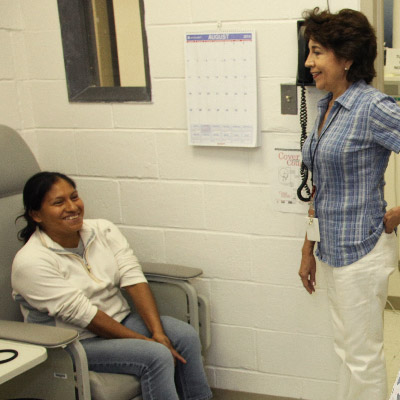- Who We Are
- Clinician Employment
- Publications
- Witness to Witness (W2W)
- El Premio Kugel & Zuroweste a la Justicia en la Salud
- Your Voice Matters: Photovoice Project
To address the critical need for relevant information about the Migrant and Seasonal Farmworker (MSFW) population nationwide, the Migrant Clinicians Network developed an innovative project to test a set of methodologies for collecting and analyzing MSFW data. The methods used in this project will enhance planning capability for health services by gathering up-to-date, locally specific descriptive profiles of the MSFW population eligible for health care services and provide a mechanism to determine future trends that can affect health services delivery and formulation of health care plans, staffing decisions, outreach activities, preventive care emphases, budgeting and appropriate service hours. The methodologies tested employ systems that can be self-sustaining, providing continual, timely updates at a local level where such information is most useful. The systems foster collaboration between local service providers, encouraging Migrant Health Centers (MHCs) and others who serve the MSFW population to work together to share information which can be beneficial to all.
Several concepts related to establishing on-going systems to track, profile, and predict the characteristics of the ever-changing MHC target patient population across the country were tested. These included:
- Querying knowledgeable individuals can yield an accurate profile MSFWs/identify changes
- Strategic collection of utilization data from a consortium of local service agencies can be conducted periodically to yield a current profile of MSFWs
- Documentation of change factors for local agricultural and agricultural worker characteristics can inform service design and delivery
The methods and concepts were tested through the development and implementation of three data collection projects. Each used a variety of instruments including a 36-item questionnaire requesting qualitative and quantitative data, portions of questionnaire by topic areas, that were utilized to collect data in various venues either directly, in- person or by telephone or indirectly via mail or web. The projects included:
- Gathering input from knowledgeable individuals to profile MSFWs/identify changes
- Development of a system to profile MSFWs from service agency data
- Agricultural and MSFW Characteristics Change Factors
Results:
- No significant difference in responses between respondent groups
- Immigration issues significant in all regions
- More single men, fewer women and children
- Increase in seasonal workers who no longer migrate
- Increase in the number of workers seeking employment
- Greater representation from Central America, Caribbean and Pacific
- Conflation of anti immigration sentiment with anti-Latino sentiment
- Pervasive sense of fear as a result
- Creating labor shortage/ shift in industry to reduction in traditional hand labor crops and less processing
- Respondents express strong sense of commitment to provide health care services to migrants
- Economic circumstances of patients affecting financial viability of clinics
- Respondents could see great utility for the proposed data collection project
- Assessment of services
- Identification of patient needs
- Advocacy
- Pursuit of funding
- Targeting underserved segments of the population
- Programs with national funding and oversight collect data elements comparable to one another
- Collating of user data across national programs at the state level can yield useful information
Regional Specifics
- Access to water will affect agricultural industry
- Housing both in terms of availability and quality an issue
- Results most useful when aggregated regionally
- Respondents in Western U.S. noticed more seasonal farmworkers with families settling in their area
- More indigenous representation in the West with corresponding language challenges
- Greater labor shortages noted in the West
- 58% of respondents in the West indicated farm or plant closings
- More individuals looking for agricultural work in the East
Challenges Identified
- Loss of complementary funding (Medicaid/state/foundations)
- Ability of patients to pay for care
- Indigenous languages
- Variations in culture of health
- Hiring/retaining clinicians
- Pervasive sense of gloom concerning availability and access to health care for migrants
- Eligibility definitions vary at multiple levels
- Inability to cross reference users
- Technical capability of local programs for data collection/extraction
- Privacy and confidentiality
- Completeness of data collected/extracted
Conclusions
- There is a need for real time, accurate information about MSFW populations
- Principal benefit identified by respondents was for planning/forecasting
- Short and long-term needs
- Ability to be prepared
- Ability to anticipate
- Respondents’ willingness to participate again
- Respondents principally preferred electronic method of data collection
Suggested Improvements
- Targeted questioning
- Simplify list of data elements for collection
Plans for Data Distribution
- Web cast
- MCN Streamline (bi-monthly newsletter)
- MCN website
- In year two: interactive website for agricultural information and regular updates at Stream Forums
Recommendations
- Continuation of Key Informant Sentinel Network
- Add to existing base of key informants
- Gather information on continuous basis, with additional polling when need arises (e.g. H1N1)
- Use input from the Stream Forums to profile MSFWs/identify changes
- Targeted focus groups
- Gather MSFW profile data from service agencies assisting the population for state of Michigan
- Review UDS Migrant Health Center data
- Pilot model in 2-3 additional states
- Institute interactive webpage housed within MCN website where CHCs and MHCs can access agricultural and MSFW characteristics trend data at a state/local level
Potential Outcomes
- Information gathered could:
- Result in more efficient and expeditious care for migrant and seasonal farmworker patients
- Pinpoint areas of need that can affect funding allocation
- Verify the need for retention and further recruitment of health care professionals





